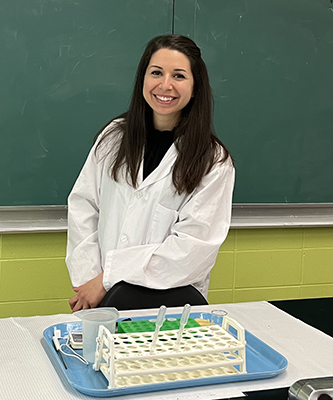Mysteries of Everyday Materials is an intriguing course offered by the Faculty of Science that teaches students about materials such as sunscreen and non-stick coatings.

Ever since Ravinder Singh took the Faculty of Science course Mysteries of Everyday Materials (NATS1830), taught by Stephanie Domenikos, he has been a strong believer in wearing sunscreen.
“I was never big on sunscreen, but we looked at different brands with different SPF levels under ultraviolet lamps in the lab,” said Singh, a recent York University graduate who works for BDO Canada as a tax accountant. “It really opened my eyes; I realized it actually mattered to my skin.”
That’s exactly the impact Domenikos, an assistant professor and environmental chemist, hopes to have on the students in her course.
“This is a science course for non-science majors and it teaches the students how everyday materials work,” said Domenikos. “I try to give my students enough of a science background to allow them to answer life’s simpler questions. It’s also a great opportunity to get non-science students into a lab setting.”
The course, which was previously delivered solely as a lecture, hadn’t been offered for a while, but when Domenikos joined York in 2018, she overhauled it to include lab experiments. Then came the pandemic, and she was reduced to doing demonstrations on Zoom for her students, which “is not the same experience.” This year, students are back in the laboratory.
“At first, students were intimidated by the word ‘lab,’” Domenikos noted. “Many of them actively avoided science in high school and found it daunting to have labs, but they realized that it isn’t complicated; it’s just an opportunity to apply what they’ve learned in lecture and to use their hands. They began to enjoy it, said they felt like scientists and were proud of themselves.”
Singh was initially intimidated by the prospect, but quickly changed his mind.
“I had just transferred to York from Sheridan College and this was my first class,” he said. “I took it just because there was a science requirement. I didn’t remember anything about chemistry from high school, but Stephanie told us she would teach us everything from scratch. I’m so lucky, because she was a great professor.”
There are 10 lab periods in the two-semester course and the students work with the same partner throughout. The experiments they conduct complement the lectures Domenikos delivers in class. The lectures explore questions such as how batteries work, how fireworks get their colours, how soap cleans hands and how gasoline engines work.
The battery lecture, for example, is followed by a lab where students create their own batteries from wire and various solutions. They also test the conductivity of various foods, such as tomatoes and lemons, to see if these items allow electricity to pass through them.
Singh fondly remembers measuring the amount of fat in potato chips, causing him to realize that “I really shouldn’t be eating these things.
“We discussed Advil and ibuprofen and what they actually do to stop pain; how non-stick cooking pans work; and how microwaves operate – little things you never think about.”
Domenikos says the labs allow them to see the application of the lectures and the experience “stays with them. It worked really well to change their mindset. A lot of my students come into the course with a ‘hate science’ mentality.” She believes science knowledge is important no matter what career path her students are pursuing.
“This is our next generation. They will be our voters and our policymakers. An understanding of science will help them make more informed decisions. York wants to produce well-rounded students who can be active participants in society.”
